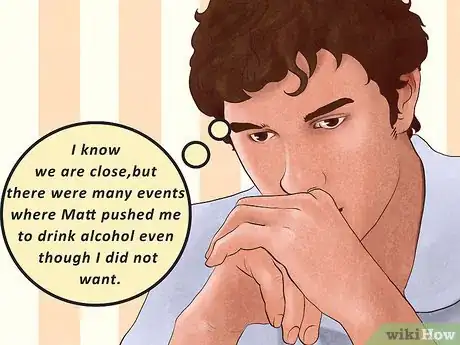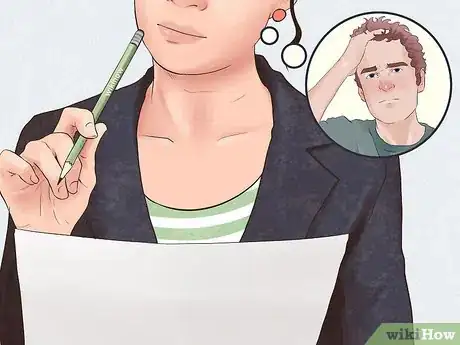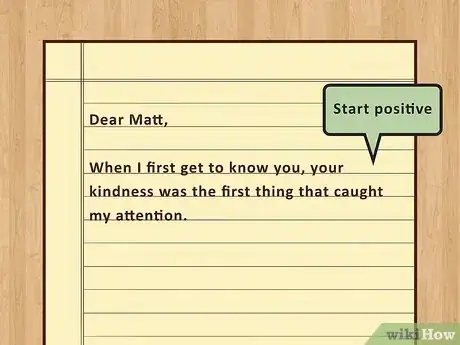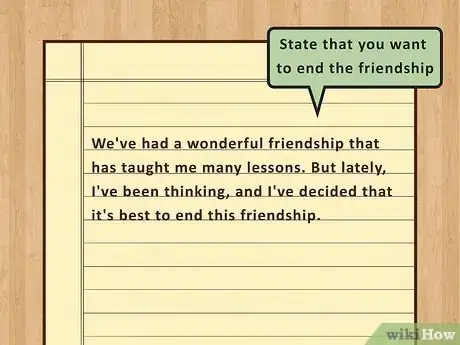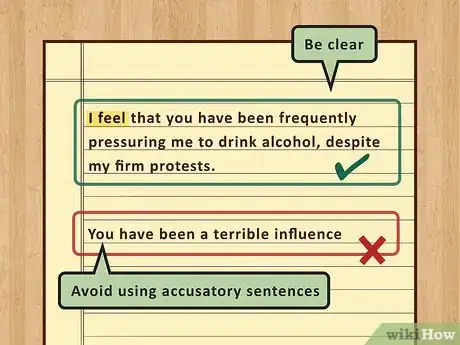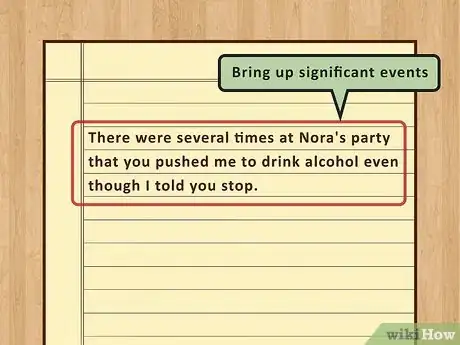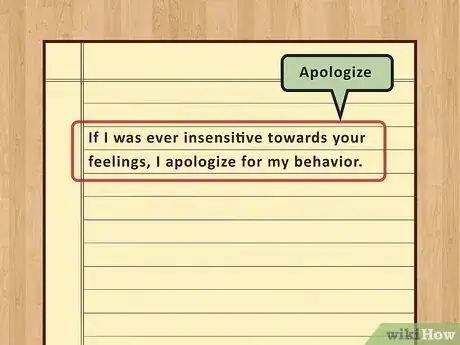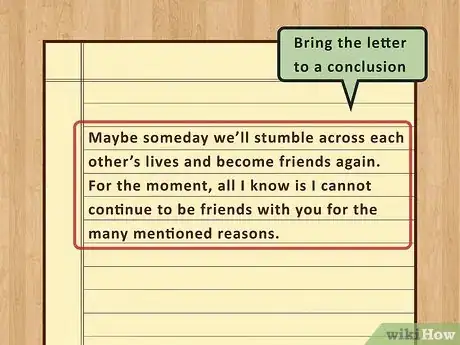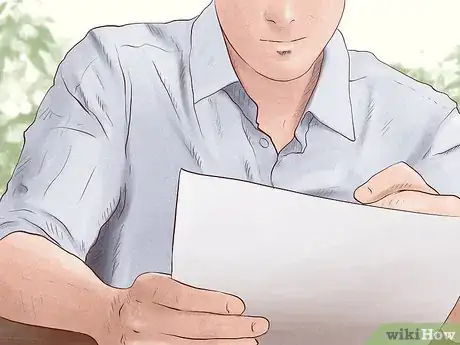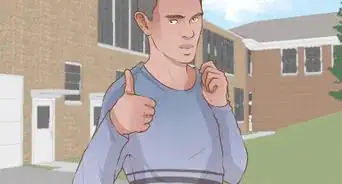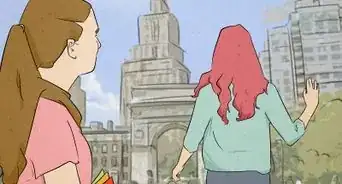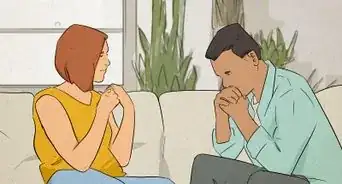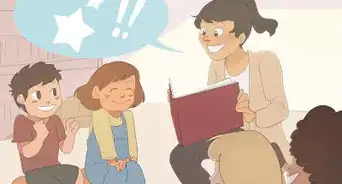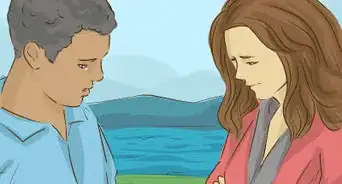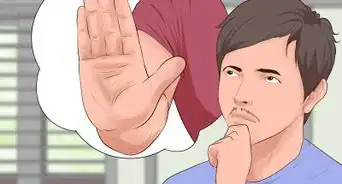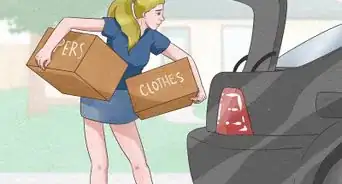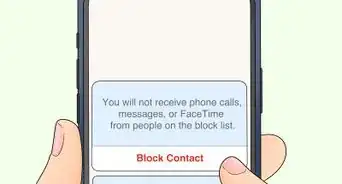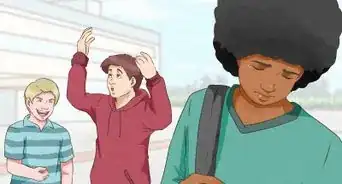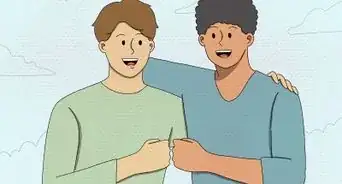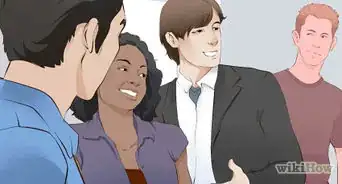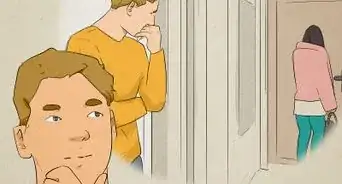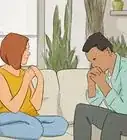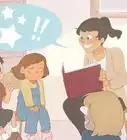This article was co-authored by Jessica George, MA, CHt. Jessica George is a Marriage and Family Therapist, Certified Professional Master Life Coach, and Co-Founder of Evolve Therapy Coaching based in Glendale, California. With more than 20 years of experience, she specializes in hybrid therapy and coaching services, couples counseling, and clinical hypnotherapy. Jessica holds a Bachelor’s degree from The University of California, Santa Barbara and an MA in Counseling Psychology and Talk Therapy from Ryokan College. Jessica is trained in the Imago technique and the Gottman method for couples therapy. She also earned a Professional Life-Coach Certification from The Fowler Academy and an Infinite Possibilities Relationship Certification. She is a member of the International Board of Coaches and Practitioners (IBCP).
This article has been viewed 55,861 times.
Ending a friendship through a letter can be difficult and painful. There may be a lot of words that you want to express, but you want to make sure that you get your point across. You may be feeling emotional and uncertain of what you should write. If you want to end a friendship through a letter, this article will provide you with simple, basis steps and help ease the process.
Steps
-
1Ask yourself why you want to end the friendship. Terminating a friendship can be a painful, difficult process, especially if you are close with one another. Before cutting ties with your friend, set aside your emotions and consider your reasons for leaving them. Be sure that you have valid ones before continuing on. Writing a hurtful letter to your friend in a fit of anger or grief may cause you to regret it later, so it's best to evaluate the situation while you're calm.[1]
- If you have trouble deciding whether it's best to end the friendship, you may want to consult others since this is an important decision. Trusted family members are a good choice. If you decide to ask your friends for advice, make sure that they don't have a relationship with the friend you're thinking of breaking up with.
-
2Consider their feelings. Reading the letter and coping with the loss may be hard for your friend. Even if they may not care about losing the friendship, they have feelings as well, so be sure not to write any hurtful or unnecessary remarks in your letter. Being mature about ending the friendship is important; otherwise, your friend may resent you because of your words and may attempt to get revenge in the future. If you have trouble keeping your feelings separate from your letter, it may help to write an emotional letter filled with everything you want to say before tearing it up.Advertisement
-
3Start positive. Even if your friendship has come to the point where you must end it, there probably are some happy memories that you have shared with your friend. Although you should avoid going too deep into them, list a few positive traits about your friend to let them know that you do care about them. For instance, you could say, "Your kindness was the first thing that caught my attention" or "You have always been supportive of me." This will soften the blow and help your friend understand that you don't mean to hurt them.
-
4State that you want to end the friendship. After listing the positive, you should quickly bring the letter to the main focus, which is the termination of your relationship. Clearly state that you wish to cut off ties, and make sure to emphasize whether this is temporary or permanent. Although you don't have to be blunt, you should be sure that your intention is clear. If you're afraid of hurting your friend's feelings - especially if they're sensitive - you could write something along the lines of, "We've had a wonderful friendship that has taught me many lessons. But lately, I've been thinking, and I've decided that it's best to end this friendship."
-
5Be clear. Once you have stated that you want to end the friendship, bring up your reasons to back up your argument. Consider the points you want to make. To avoid confusing your friend or not correctly conveying your message, clearly state your reasons for leaving and explain why without beating around the bush. Make sure that they are valid and straight to the point, but try not to be too hurtful. Using the words "I feel that" can help you communicate your thoughts without hurting your friend's feelings. For instance, if you think that your friend has been a bad influence on you, one of the reasons you could write is, "I feel that you have been frequently pressuring me to drink alcohol, despite my firm protests." Your purpose is to explain why you're ending the friendship and tell them about your feelings, not upset them.
- Avoid using accusatory sentences - such as "You have been a terrible influence" - as this will hurt your friend and may enrage them.
-
6Bring up significant events. There may have been moments where your friendship was strained, leading you up to this point. To back up your reasons for leaving, you may want to briefly summarize those events where your friend made you uncomfortable and gave you a reason to end the friendship. This will prove that your points are valid and that you aren't simply accusing your friend without any proof to support your arguments. An example would be, "There were several times at Nora's party that you pushed me to drink alcohol even though I told you stop." While recalling events, it may be easy to lose control of your emotions, but make sure to stay on focus and keep your letter on topic.
-
7Apologize. If you have made any negative contributions to your friendship, it may be wise to acknowledge any major faults or mistakes before apologizing for them. Make it clear that you accept responsibility for those incidents. That way, your friend won't feel as if you're attempting to push all of the blame onto them. You should also add that you're sorry that it has come to the point where you're cutting off ties. This may remind your friend that you care about them and that you don't want to do this.[2]
-
8Bring the letter to a conclusion.[3] After you have communicated your message and reasons, it's time to end the letter. State your wish to end the friendship once again. Ask them not to contact you or attempt to rebuild your relationship; otherwise, this will hinder the process of cutting off ties and make it harder for the two of you. Let them know that you still care for them but that you feel it's best that you both go your separate ways.
- If you wish to talk to your friend in person before separating, you should add that at the end of your letter. It may be wise to meet with them one last time to bring things to a close and give your friend a chance to respond. You may also want to bring a trusted relative or friend with you in case things go wrong. However, if your friend has anger issues or you fear that they may harm you, it's best to discourage any contact and refuse to see them.
-
9Reread the letter. After you have written it out, carefully go through it to make sure that you haven't made any mistakes.[4] Be sure that you have clearly stated your points and that you have said all the words that you want to tell your friend. Once you are satisfied with the letter, seal it in an envelope before mailing or handing it to your friend.
Expert Q&A
-
QuestionHow do you break off a friendship respectfully in person?
 Jessica George, MA, CHtJessica George is a Marriage and Family Therapist, Certified Professional Master Life Coach, and Co-Founder of Evolve Therapy Coaching based in Glendale, California. With more than 20 years of experience, she specializes in hybrid therapy and coaching services, couples counseling, and clinical hypnotherapy. Jessica holds a Bachelor’s degree from The University of California, Santa Barbara and an MA in Counseling Psychology and Talk Therapy from Ryokan College. Jessica is trained in the Imago technique and the Gottman method for couples therapy. She also earned a Professional Life-Coach Certification from The Fowler Academy and an Infinite Possibilities Relationship Certification. She is a member of the International Board of Coaches and Practitioners (IBCP).
Jessica George, MA, CHtJessica George is a Marriage and Family Therapist, Certified Professional Master Life Coach, and Co-Founder of Evolve Therapy Coaching based in Glendale, California. With more than 20 years of experience, she specializes in hybrid therapy and coaching services, couples counseling, and clinical hypnotherapy. Jessica holds a Bachelor’s degree from The University of California, Santa Barbara and an MA in Counseling Psychology and Talk Therapy from Ryokan College. Jessica is trained in the Imago technique and the Gottman method for couples therapy. She also earned a Professional Life-Coach Certification from The Fowler Academy and an Infinite Possibilities Relationship Certification. She is a member of the International Board of Coaches and Practitioners (IBCP).
Certified Professional Master Life Coach If something bad has happened that requires you to end the relationship, you can quietly slip out and stop contacting or connecting with them. If you see them in social situations, simply smile and say hello without engaging.
If something bad has happened that requires you to end the relationship, you can quietly slip out and stop contacting or connecting with them. If you see them in social situations, simply smile and say hello without engaging. -
QuestionHow do I write a letter to tell someone that I feel left out?
 Community AnswerIdeally, you should talk to the person face-to-face about this. If you really can't, just write down how you're feeling, and mention exactly when you felt left out and why. Ask them if could please make an effort to include you more in the future.
Community AnswerIdeally, you should talk to the person face-to-face about this. If you really can't, just write down how you're feeling, and mention exactly when you felt left out and why. Ask them if could please make an effort to include you more in the future.
Warnings
- Your friend may not take the letter well and become upset. If this occurs, it may be best to speak to them on a later occasion to prevent them from harm you or themselves.⧼thumbs_response⧽
References
- ↑ https://www.psychologytoday.com/us/blog/modern-mentality/201803/why-friendships-end
- ↑ https://www.huffpost.com/entry/the-4-rs-of-a-kick-ass-apology_b_4611815
- ↑ https://writingcenter.unc.edu/tips-and-tools/conclusions/
- ↑ https://letterwhiz.com/writing_tips
- ↑ https://au.reachout.com/articles/3-ways-to-end-a-toxic-friendship
